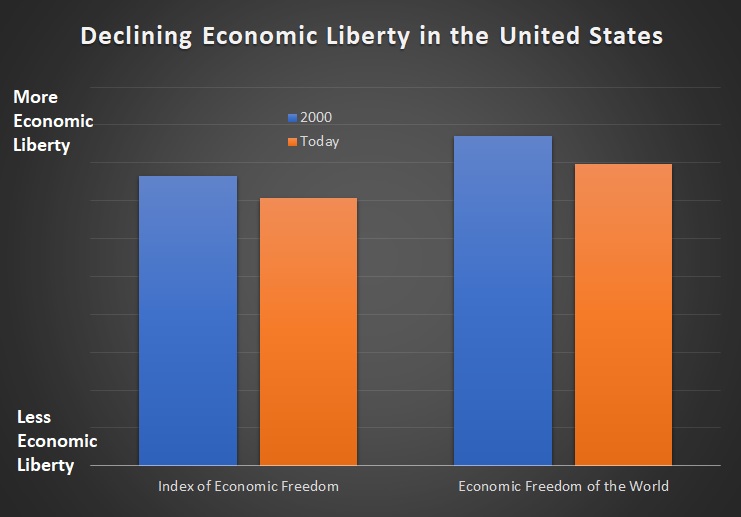I’m not a fan of so-called national conservatism, largely because many proponents of this Trump-like approach want a bigger burden of government.
- In some cases, they want new programs to increase Washington’s power over the economy (such as per-child handouts and industrial policy).
- In other cases, they want to allow existing programs to expand (such as the built-in growth of entitlements), which means massive tax increases.
I’ve long argued that folks on the right should instead rally around a Reagan-like agenda of small-government conservatism.
 That is not a surprise, given my libertarian inclinations.
That is not a surprise, given my libertarian inclinations.
I even put together a Venn Diagram to show that Reaganism is a natural home for people who are not comfortable with either Trumpism or establishment Republicanism.
And I’m not the only one who wants an alternative.
There’s a new manifesto entitled Freedom Conservatism: A Statement of Principles.
It is based in part on the notion that “individual liberty is essential to the moral and physical strength of the nation.”
Here are the core principles that unite the various signatories.
- Liberty.
- The pursuit of happiness.
- The foundation of prosperity.
- Full faith and credit.
- A nation of laws, not men.
- Americans by choice.
- Out of many, one.
- America’s promissory note.
- The shining city on a hill.
- Freedom of conscience.
You can click on the link to get details on these 10 items, though you’ll notice it’s mostly “motherhood and apple pie” rhetoric rather than specific policies.
By the way, the same is true for the competing manifesto, which is entitled National Conservatism: A Statement of Principles.
Heck, I’m surprised that there are not people who signed both documents since they are similarly well crafted to attract support (I even praised several features of the National Conservatism manifesto in a column last year, and some of the people who signed it are genuine believers in limited government).
That being said, I added my name to the Freedom Conservatism manifesto.
Why? Because I believe that Freedom Conservatism – as a concept – is based on a superior philosophy (liberty rather than nationalism) and I also think that advocates of that approach are more likely to support sound economic policies (Reaganism rather than Trumpism).
Let’s put this in practical terms. Here’s a chart showing how economic liberty in the United States has declined so far this century, thanks to an overall shift to more dirigiste policies by Bush, Obama, Trump, and Biden.
Which group wants to reverse this decline?
I think it is safe to say that the Freedom Conservatism group, on average, has sounder views.
And which group wants to reform entitlements to protect the country from massive future increases in the fiscal burden of government?
Once again, the Freedom Conservatism folks presumably are more likely to be on the right side.
I’ll close by reiterating that some of the people on the National Conservatism list are very good on economic issues, just like some of the Freedom Conservatism signatories are a bit weak. Indeed, it’s quite likely that some people signed up (with either group) because of views on non-economic issues such as immigration or foreign policy.
P.S. Even since the Reagan years, opponents of limited government and libertarian economic policies have flitted from one trendy idea to another (compassionate conservatism, kinder-and-gentler conservatism, common-good capitalism, reform conservatism, etc). Hopefully national conservatism will fade like these other fads.

No comments:
Post a Comment